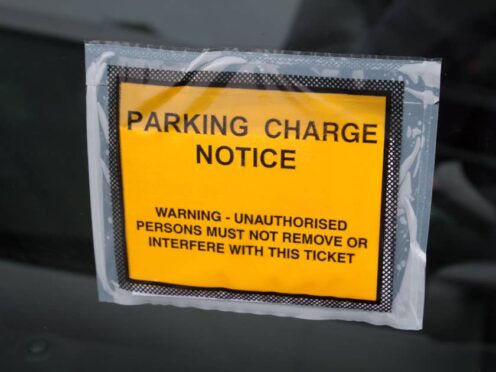
Private parking companies have been accused of “confusing drivers” after introducing a new code of conduct.
The RAC said the sector’s decision to create its own set of rules “muddies the waters” amid delays in new Government regulations being implemented.
The code of practice launched by two industry bodies includes a 10-minute grace period for motorists to leave a car park after the parking period they paid for ends.
It also features requirements for consistent signage, a single set of rules for operators on private land and an “appeals charter”.
Private parking businesses have been accused of using misleading and confusing signs, aggressive debt collection and unreasonable fees.
A Bill to enable the introduction of a legislation-backed code of conduct received Royal Assent in March 2019.
This code – due to come into force across Britain by the end of last year – included halving the cap on tickets for most parking offences to £50, creating a fairer appeals system, and banning the use of aggressive language on tickets.
But it was withdrawn by the Government in June 2022 following a legal challenge by parking companies.
RAC head of policy Simon Williams said: “We’re flabbergasted that the British Parking Association (BPA) and the International Parking Community (IPC) have suddenly announced plans to introduce their own private parking code after doing all they can over the last five years to prevent the official Government code created by an Act of Parliament coming into force.
“While there are clearly some positive elements to what the private parking industry is proposing, it conveniently avoids some of the biggest issues around caps on penalty charges and debt recovery fees which badly need to be addressed to prevent drivers being taken advantage of.
“These elements, alongside a formal appeals process, are currently being worked on by the Government and in our opinion can’t come soon enough.
“Nothing should stand in the way of the official code, least of all a new industry scheme which muddies the waters and risks confusing drivers.
“For the private parking industry to all of a sudden paint themselves as being whiter than white with their own code and appeals charter takes irony to another level.”
Nicholas Lyes, director of policy and standards at charity IAM RoadSmart, said: “Drivers will wonder what has taken parking associations so long to publish the new code.
“No matter how they might dress it up, this is primarily being driven by new laws around the Government-led Parking Code of Practice, rather than a self-proclaimed gesture of being fairer to motorists.
“Some might say it is jumping before being pushed.”
Analysis of Government data by motoring research charity the RAC Foundation found 9.7 million tickets were issued to drivers by private parking companies in Britain between April and December last year, which is equivalent to nearly 35,300 every day.
BPA chief executive Andrew Pester said: “We are delighted to introduce a single code of practice across the private parking sector.
“This is a crucial milestone as we work closely with Government, consumer bodies and others to deliver fairer and more consistent parking standards for motorists.
“We will continue to push for a positive outcome for all.”
IPC chief executive Will Hurley said: “This is a long-awaited day, the sector has been calling for a single code of practice for a long time and today we are proud to be committing to it.
“The single code will benefit all compliant motorists and will present clear consequences for those who decide to break the rules.
“The sector has listened to the motoring community and today we are acting.”
A spokesperson for the Department for Levelling Up, Housing and Communities (DLUHC), which ran a new call for evidence on its code last year, said: “We are pleased to see the industry has recognised the unfairness of the current private parking system and the need for change by introducing this single industry code.
“Whilst this is a positive step forward, it is only through the introduction of our private parking code of practice that we will strengthen the existing system of regulation.”

Enjoy the convenience of having The Sunday Post delivered as a digital ePaper straight to your smartphone, tablet or computer.
Subscribe for only £5.49 a month and enjoy all the benefits of the printed paper as a digital replica.
Subscribe